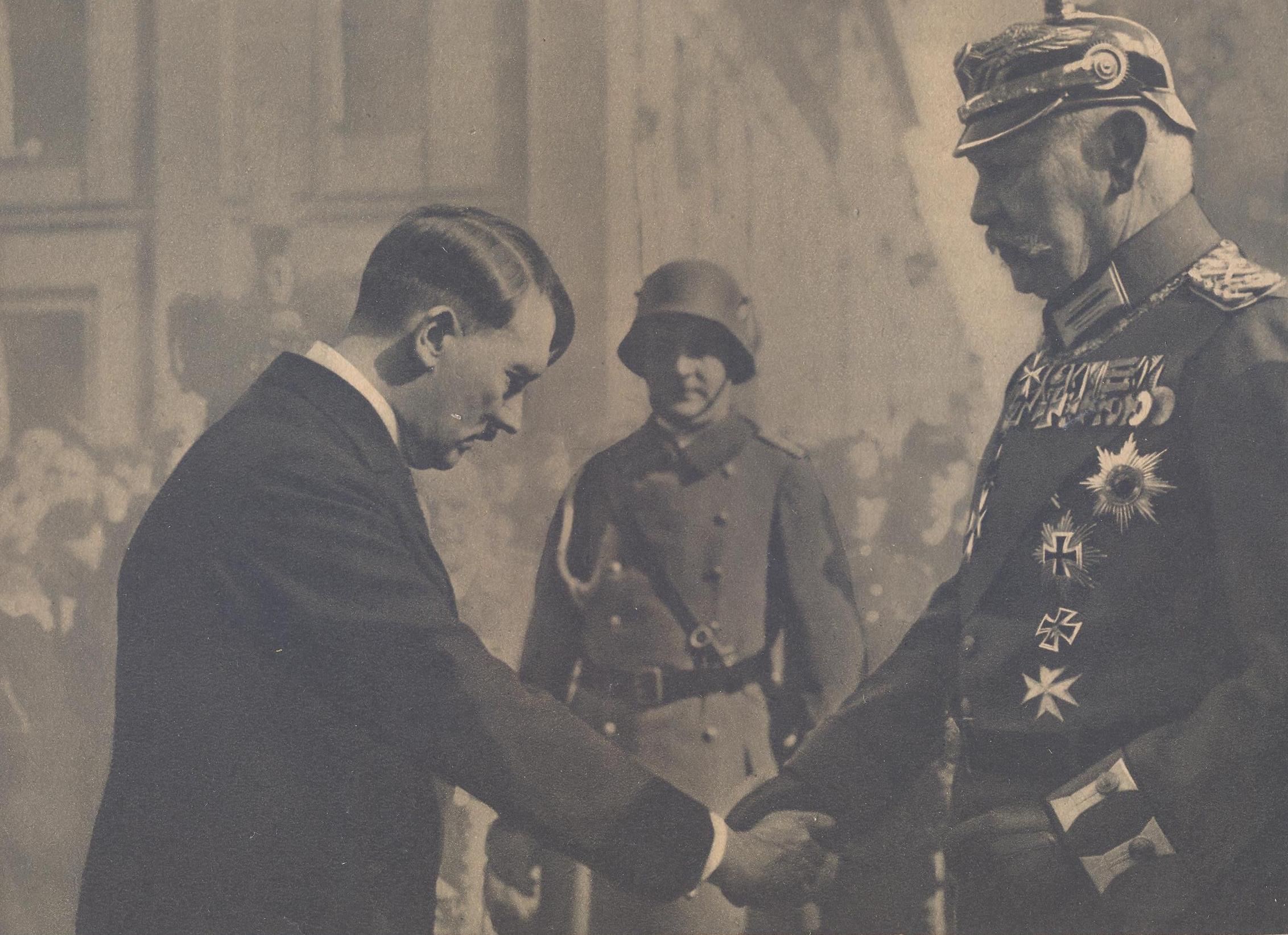 Adolf Hitler and German President Paul von Hindenburg, Potsdam 1933
Adolf Hitler and German President Paul von Hindenburg, Potsdam 1933 Peter Hayes is professor of history and German and Theodore Zev Weiss Holocaust Educational Foundation Professor of Holocaust Studies Emeritus at Northwestern University and chair of the Academic Committee of the United States Holocaust Memorial Museum. Professor Hayes received his PhD from Yale University and taught at Northwestern for thirty-six years from 1980 to 2016. He is the author or editor of twelve books, including the prize-winning Industry and Ideology: IG Farben in the Nazi Era (1987, 2001) and Lessons and Legacies: The Meaning of the Holocaust in a Changing World (1991).
This exchange focuses on Professor Hayes’ new book Why?: Explaining the Holocaust (W. W. Norton & Company, 2017). Part 1 can be found right here.
***
Dear Professor Hayes,
In a chapter of your book entitled “Why the Germans?” you write the following about the misunderstood role of anti-Semitism in Adolf Hitler’s rise to power:
Yet the centrality of the so-called Jewish problem was much more important and obvious to Hitler than to the average German voter. We have no reason to think that the antisemitic nucleus of his ideology propelled Hitler’s rise to power. It played an important role in attracting many of the core believers to the Nazi Party, but not the mass of the Nazi electorate. Hitler was a product of crisis and opportunity, and Germans seem to have been drawn to him out of desperation and a sense that only the Nazis were energetic and organized enough to deal with the nation’s woes.
In your introduction you mention the idea of anti-Semitism bringing Hitler to power as one of the common myths that your book debunks. I would like to ask about the significance of rectifying this mistake: how can debunking this particular myth change our understanding of the lessons of the Holocaust?
Yours,
Shmuel
***
Dear Shmuel,
Getting this right redirects our attention from pre-existing beliefs as the cause of the Holocaust toward politically induced ones, from attitudes toward Jews in Germany prior to 1933 toward convictions about them shaped thereafter. And in doing so, the debunking invites readers to reflect on the conditions that amplify antisemitism and those that mute it, both in the past and in the present.
If a person believes that antisemitism propelled the rise of Nazism, s/he may conclude that preventing a repetition is a matter of stamping out Jew hatred. Good luck with that. The focus is too narrow and negative, and the desirable outcome impossible. But if a person understands that Hitler’s antisemitic beliefs made him nothing more than a political also-ran—the Nazis polled in the single digits in the parliamentary elections of 1924 and 1928—until the economic catastrophe of the Depression increased the appeal of those beliefs to some Germans and, more importantly, handed him the power to inculcate them in those beliefs, then the lesson to draw is different.
That lesson centers around two interrelated points that I make toward the end of the book. First, in the western world antisemitism has been and is a parasitical issue that needs “situational causes” to obtain power. Avoid these, and antisemitism generally remains the property of cranks on the fringes of a nation, just as the Nazis were in Germany in the 1920s. Don’t avoid these causes—sink into economic crisis and political turmoil, raise the level of anxiety in a society—and antisemitism may flourish. Second, the security of minorities anywhere, including Jews, depends on the strength of liberal values of tolerance, civility, and fairness there. The way to fight Jew hatred is to assert positive values in which all people (and peoples) should and usually do have a stake. Let these decay, and the haters will multiply. The Euro-American historical record of the last two centuries suggests that fighting antisemitism is necessary, but not sufficient to prevent the demonization and persecution of Jews. Why? Because antisemitism is too embedded and persistent in Euro-American culture to stamp out entirely, but strong enough to become a governing ideology only when events panic non-Jews into giving power to believers in this superstition. This line of thought is less reassuring than it sounds, since directly confronting antisemitism is actually theoretically easier than heading off or stemming the crises on which it feeds. Antisemitism is containable and largely has been contained in countries that make virtues of pluralism and individual
rights and that enjoy relative political and economic stability. But when these conditions erode, along with norms of decent speech and behavior, antisemitism rises, as if from the dead.
Hatred of Jews propelled Hitler toward the Holocaust, but antisemitism did not propel Hitler to power. In the first place, a majority of Germans had never voted for him and his racism before he became Chancellor of Germany in 1933. In the second place, those who had done so often cast their ballots for reasons unrelated to antisemitism, mostly their own desperation for deliverance from the Depression and political gridlock. And in the third place, Hitler owed his appointment to a group of aristocratic intriguers who persuaded President von Hindenburg to make Hitler Chancellor because they thought they could use him, not because they shared his racism (though some did).
Within six years of Hitler’s accession, however, most Germans affirmed Hitler’s antisemitism or acted as if they did, which amounted to the same thing. Their beliefs and behavior conformed to the prevailing ideology’s call for a kind of mass exorcism. Recognizing that virtually an entire nation quickly fell in behind this program is at least as worrisome as erroneously assuming that it provided the principal fuel for Hitler’s rise.























 More news and opinions than at a Shabbat dinner, right in your inbox.
More news and opinions than at a Shabbat dinner, right in your inbox.